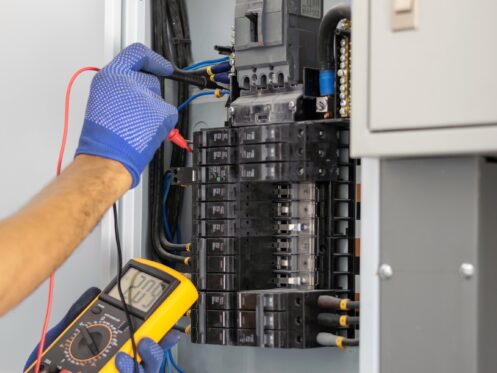Your electrical panel keeps your home powered by sending electricity where it’s needed, but it won’t last forever. As modern technology advances and energy demands increase, older panels can struggle to keep up. If your lights flicker, breakers trip often, or appliances don’t seem to run as smoothly as they should, your panel might be overloaded or outdated.
If you don’t pay attention to these signs, bigger problems could happen, including fire hazards and expensive repairs. That’s why Christian Brothers Air Conditioning Plumbing Electrical in Glendale, AZ is here to help you determine whether it’s time for an upgrade and ensure your home stays safe and efficient.
Frequent Breaker Trips and Power Surges
When your electrical panel is working as it should, you probably don’t think much about it. But when breakers start tripping regularly, it’s hard to ignore. Breakers shut off power to prevent overheating and fires when circuits get overloaded. An occasional trip isn’t a problem, but if the same one keeps shutting off, your panel might be struggling to handle your home’s electricity.
Another warning sign is frequent power surges. If your lights dim when you turn on an appliance or if your electronics shut off unexpectedly, your panel could be struggling to distribute power properly. Surges can wear down sensitive devices, leading to the early failure of computers, televisions, and even kitchen appliances. An electrical panel upgrade can provide more stable power, keeping everything in your home running safely and smoothly.
Flickering or Dimming Lights
A flickering lightbulb isn’t always a sign of a bad bulb. If a new bulb doesn’t fix it, your electrical panel could be the problem. Lights that dim or flicker when you use other appliances suggest that your panel is overloaded. Older panels weren’t designed for today’s high-energy homes, which now have power-hungry devices like smart appliances, gaming systems, and multiple TVs running at the same time.
If you notice your lights flickering when the air conditioner kicks on or the washing machine starts a cycle, your system could be struggling to manage the demand. This isn’t just an annoyance—it’s a sign that your electrical panel isn’t distributing power effectively. Upgrading to a modern panel can help eliminate these fluctuations, ensuring that every light and appliance in your home gets the steady power it needs.
Your Home Still Has a Fuse Box
If your home has an old-fashioned fuse box instead of a breaker panel, it’s time to consider an upgrade. Homes built before the 1960s often had fuse boxes, which worked fine back then but weren’t designed to handle the electricity demands of modern appliances and devices. Modern appliances, air conditioning systems, and home electronics require more electricity than a fuse box can safely manage.
One big problem with fuse boxes is that they depend on fuses that need to be changed when they get too full. Some homeowners, instead of replacing a blown fuse with the correct one, might use an oversized fuse or even bypass the fuse altogether. This is a serious fire hazard. Breaker panels, on the other hand, can be reset safely without the need for replacement. If your home has a fuse box, switching to a circuit breaker panel makes things safer and easier to manage.
Burning Smells or Scorch Marks
A burning smell in your home is never something to ignore, especially if it’s coming from your electrical panel. This could mean that the wires are overheating or that the components inside the panel are failing. In some cases, you may also notice scorch marks, melted wires, or even a warm panel cover. These are clear indicators that something is wrong.
Electrical panels are built to handle power safely, but if they are overloaded or aging, they can overheat. This can lead to burned insulation, damaged wiring, and, in the worst cases, an electrical fire. If you ever notice a burning smell near your panel or outlets, shut off power to the area and call an electrician immediately. Upgrading to a new panel can prevent these dangers and keep your home’s electrical system in safe working condition.
Your Panel Is 20+ Years Old
Electrical panels don’t last forever. If yours is more than 20 years old, it might not be up to the task of handling modern electricity demands. Older panels weren’t designed for the number of appliances and devices found in homes today, including things like home video systems, charging stations, and powerful cooking tools.
Beyond power capacity, older panels may also lack the safety features found in modern systems. Breakers in outdated panels can wear out, meaning they may not trip when they should, increasing the risk of electrical fires. If your panel is showing signs of age, upgrading it can give you peace of mind that your electrical system is safe and reliable.
Adding New Appliances or Home Additions
Anytime you upgrade your home with new appliances or additions, it’s a good idea to check if it’s possible for your electricity panel to handle the extra load. High-powered appliances like air conditioners, hot tubs, and electric vehicle chargers require a significant amount of energy. If your panel doesn’t have enough capacity, these additions could overload the system.
The same goes for home renovations. Adding more rooms, finishing a basement, or making a home office with lots of tools can all make you use more electricity. A professional electrical services team can evaluate your panel and determine if an upgrade is necessary to support your home’s new demands.
Buzzing or Cracking Sounds From the Panel
Electricity is supposed to be silent. If you hear buzzing, crackling, or popping noises coming from your panel, that’s a problem. These sounds could indicate loose connections, faulty breakers, or damaged wiring inside the panel.
Loose electrical connections can generate heat, which increases the risk of fire. If you ever hear unusual noises from your panel, it’s best to have it checked as soon as possible. An expert can check your panel, secure any loose connections, and see if it needs to be replaced.
Frequent Brownouts or Low Voltage Problems
Brownouts occur when voltage drops temporarily, causing lights to dim and appliances to struggle. Unlike full power outages, brownouts don’t cut electricity completely, but they can still cause problems for your home’s electronics. If your lights dim when you run the microwave or your computer randomly shuts down, your electrical panel may not be delivering a consistent power supply.
Low voltage can damage sensitive electronics, shorten appliance lifespans, and reduce overall efficiency. A panel upgrade can help stabilize power delivery and prevent these frustrating fluctuations.
Sparks When You Plug in Your Devices
If you see sparks when plugging something into an outlet, it might not be a big deal—sometimes a little static discharge happens when plugging in a device. But if you notice large sparks, excessive heat, or even scorch marks around outlets, your electrical system may have deeper issues.
Sparking outlets could indicate loose wiring, overloaded circuits, or even faulty breakers. An electrician can inspect the problem to determine whether it’s a wiring issue. Or they can see if your panel needs to be updated so it can safely handle the electricity load of your home.
Contact Us Today
An outdated electrical panel isn’t just an inconvenience—it can be a safety risk. If your home’s power struggles to keep up with your daily needs, it’s time to take action. By upgrading your panel, you can make sure that your electrical system works safely and efficiently, avoiding breakdowns and other problems that could be dangerous. Don’t wait until you’re left in the dark—call Christian Brothers Air Conditioning Plumbing Electrical today to schedule a professional inspection and upgrade consultation.










